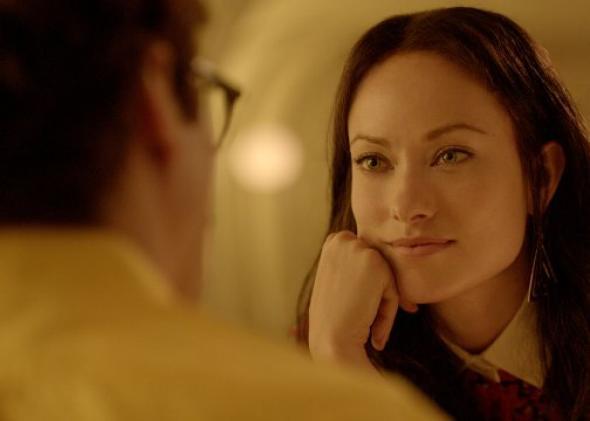In a scene about halfway through Spike Jonze’s thought-provoking sci-fi romance Her, Joaquin Phoenix’s character goes on a blind date with a sexy Harvard grad played by Olivia Wilde. They meet in a sleek, dark restaurant, get a little tipsy, and end up talking about what animals they resemble. Then, agreeing that it’s been a pleasant evening, Wilde’s character says something like, “Don’t you just love Asian fusion?”
It’s a jarring moment in a film that is otherwise seamless in its construction of a plausible near-futuristic Los Angeles. Does Spike Jonze really think we’ll be eating Asian fusion cuisine in a few decades?
As Sara Dickerman explained in Slate last year, the term “Asian fusion” was born in the late 1980s, when European chefs like Wolfgang Puck and Jean-Georges Vongerichten created restaurants that self-consciously combined Chinese, Japanese, and Thai ingredients (ginger, daikon radish, coconut milk) with classical French preparations (vinaigrette, beef stock, mousse)—and vice versa. By the early 2000s, Asian fusion had trickled down to the Food Network and Chili’s and consequently seemed fusty and tired. This isn’t to say that the idea of remixing Asian food with other world cuisines died out—instead, chefs like Danny Bowien in San Francisco (and New York) and Roy Choi in L.A. began dishing out “Americanized Oriental Food” and Korean tacos. Not many chefs call their cuisine “fusion” anymore—in fact, New York magazine recently proclaimed, “Asian hipster cuisine has replaced Asian fusion cuisine.”
So why did Jonze choose a slightly passé type of cuisine as an exemplar of what hip white Los Angelenos will be eating in the future? I reached out to Her’s publicist with this question and was told that Jonze is unavailable. And while I may be overthinking this, I want to believe that Jonze made the choice deliberately, both because he seems like a deliberate filmmaker in general and because he seems to have his finger on the cultural pulse. Jonze recently gave the Guardian an interview in which he talked about L.A. and said, “There’s more good food here than ever before, better restaurants. In some parts of the world, like right here, you can feel the future coming toward you and a lot of it … is getting better all the time.”
So sending Joaquin Phoenix’s character on a date at an Asian fusion restaurant may be an appreciative nod to the creativity of L.A. chefs like Choi, who mash up Asian and other flavors with abandon, and a vote of confidence for this type of cooking’s staying power. Or perhaps the choice of an Asian fusion restaurant is a clever acknowledgment of the life cycle of trends: First they catch on among an upper echelon of trailblazers (see Wolfgang Puck’s Chinois on Main in the 1980s), then they get so popular that they lose their cachet (hence present-day chefs’ resistance to use the term “fusion”), and finally they become an unremarkable part of mainstream culture. “Asian fusion,” for all its quaint connotations, is a fairly succinct and straightforward phrase that encompasses a wide swath of the restaurant scene.
But I suspect our vocabulary for describing Asian-inflected hybrid cuisines will expand, rather than regress, in the future. I might have been less surprised to hear Wilde character’s endorsement of the food she’d just eaten if she described it as “Japanese couscous” or “Chinese pizza.” Of course, a reference to such a self-consciously creative hybrid in Her would surely elicit laughs from many audiences; “Asian fusion” is just familiar enough not to seem humorous. Still, it was one of the only parts of Her that I found a little hard to swallow.
